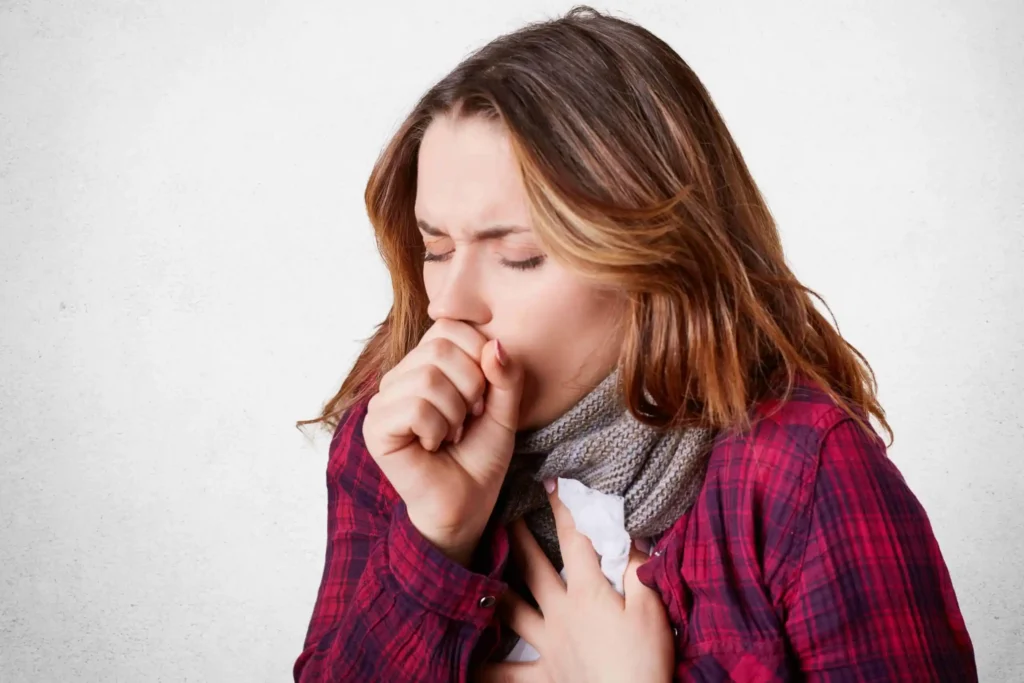Coughing can be very annoying, especially when the cause is unknown. A question asked by many people is: Can allergies make you cough? The answer is yes. Allergies may inflame your airways, causing a persistent, dry cough that does not feel similar to the cough caused by a cold or an infection.
Being aware of the symptoms of an allergy cough allows you to seek the right treatment, avoid taking unnecessary drugs, and prevent complications. This guide will tell how allergies provoke coughing, how to identify it, and when a patient should seek urgent treatment.
Understanding Allergy-Related Coughing
The reaction of your body to allergens like dust, pollen, or pet dander causes your immune system to release histamines. These chemicals cause throat and airway irritation, which can lead to a dry cough. Unlike a cold or flu, a cough due to allergies is not contagious and typically continues as long as the allergens are present.
Key Indicators That Point to Allergies
How can you tell that your cough is from an allergy? Signs may include:
- Feeling itchy in the throat or back of the mouth.
- Thin nasal mucus instead of thick mucus.
- A cough that becomes worse when outside during pollen season or inside around dust or pets.
- Symptoms that clear up after antihistamines.
When you see these patterns, your cough is likely related to the allergy. These are the symptoms for you to seek urgent care help to get control over it.

When Coughing Isn’t Just Allergies
Not every cough is an allergy-related one. It is important to note that there may be some other cause of your symptoms. A cough can sometimes be an indicator of an underlying health condition that may require medical attention. Being aware of the difference can allow you to receive appropriate treatment quickly.
Asthma-Linked Coughs
Asthma may be confused with allergies because both involve irritation of the airways. But asthma usually comes with wheezing, shortness of breath, and chest tightness accompanied by coughing.
Acid Reflux and GERD as Triggers
Acid reflux, sometimes called gastroesophageal reflux disease (GERD), may irritate the throat as a result of acid flow upwards. This usually occurs when the muscles that hold acid in the stomach fail to seal firmly.
When the acid rises, it may produce a burning sensation in the chest, sourness in the mouth, and a difficult cough. Others find that it is worse at nighttime, when lying down, or after consuming fatty or spicy foodstuffs.
Other Less Common Triggers
Not all causes of cough are allergies, asthma, or acid reflux. For example, smoking irritates the lungs and causes a chronic cough. Some medications, such as those used to treat high blood pressure (ACE inhibitors), can also cause coughing as a side effect. Infections like bronchitis, cold sores, or pneumonia can worsen your cough and may be accompanied by fever, fatigue, or mucus.
Seeking proper care ensures relief, whether through personalized allergy management or effective cold sore infection treatment that helps reduce pain, speed up healing, and prevent frequent outbreaks.
Environmental factors, such as exposure to polluted air or strong chemical fumes, may also irritate your throat and lungs. When the cough persists for several weeks or continues to worsen, consulting a doctor is necessary to rule out such conditions.

Why Allergies Lead to Coughing
In the case of allergies, your body can react too strongly to harmless things, such as pollen, dust, or pet dander. Your immune system fights them by releasing histamines. The chemicals produce swelling and irritation of the nose, throat, and airways.
The additional mucus commonly pours into the back of your throat, which is called postnasal drip. This produces an itching or prickly sensation that causes one to cough. An allergy cough is persistent and often dry because the irritation persists in the presence of allergens, particularly during the allergy season.
Medications That May Cause Cough
It might be surprising, but even certain types of allergy treatment can worsen coughs in some cases. For example, nasal sprays, when used improperly, may drip down the throat and result in irritation, leading to increased coughing.
Some drugs, such as blood pressure medications like ACE inhibitors, also cause a dry cough. Take allergy medications as prescribed and consult the doctor when the cough does not improve when using the medication.
Antihistamines and Their Role
Antihistamines are the most widely used form of treatment in the case of allergy as they prevent the effect of histamine, which produces sneezing, a runny nose, and watery eyes. They are also helpful in minimizing postnasal dripping that causes coughing.
Older forms of antihistamines may occasionally dry you out too much, including your throat and airways, which can also worsen a cough. Newer, non-drowsy antihistamines are unlikely to do so. That is why it is important to have the right medication and even combine it with other treatments to have lasting relief.
Allergies can trigger throat irritation, congestion, and overall discomfort, making everyday activities harder to manage. In addition to allergy care, many individuals also need support for throat-related issues. Professional care offers both effective allergy management and reliable sore throat relief, helping ease pain, reduce inflammation, and restore comfort quickly.
Managing and Treating an Allergy Cough
Relief from an allergy cough is based on the severity of your symptoms and their cause. Although some people find immediate relief from over-the-counter medication, others might need a lifestyle change or natural cures. The trick is to treat the cough and also the causes of the cough.
Over-the-Counter Relief Options
Most common options include antihistamines, decongestants, as well as saline sprays. These drugs relax congestion, reduce mucus secretion, and relieve throat irritation. They are the most common treatment, and are normally applied with mild or moderate cases, which are available at local pharmacies. When used as prescribed, they can minimize coughing fits and improve breathing.
Tackling Nighttime Allergy Cough
An allergy cough usually becomes worse at night as you lie down. Raising your head with more pillows, making use of an air purifier, or even taking a shower before going to bed to wash off allergens can make nights easier.
The reason is that allergens such as pollen or dust are likely to land in your bedding or bedroom air and disturb your throat at night. A few adjustments to your nighttime routine will turn out to have a major impact on the quality of your sleep.
Natural Remedies That Can Help
Home remedies such as honey, warm teas, and steam can help soothe the throat. Rinsing the nasal passages with saline solutions also eliminates allergens that cause coughing. As opposed to medications, natural care is gentle and can be applied on a routine basis without any side effects. They moisten your airways as well as make them less sensitive to coughing.
Environmental Changes for Better Breathing
Allergen exposure reduction is a major step. Close the windows when pollen counts are high, wash bedding once a week, and use a HEPA filter vacuum to reduce indoor allergens. Such practices ensure a healthy space and make it difficult to form allergens in the air. Over time, maintaining a low-allergen home can stop the cough from returning.

Preventing Allergy-Induced Coughing
Prevention is most effective when you are aware of what triggers you. Allergy testing can assist in identifying problem allergens. After knowing them, you can be able to take preventive actions:
- Employing air purifiers
- Taking a shower after outdoor activities
- Avoiding smoking or smoky areas
- Wearing masks at times when there is a huge amount of pollen release
These measures significantly minimize the risks of developing a chronic allergic cough.
When Urgent Care Becomes Necessary
Simple measures can be undertaken to manage most allergic-induced coughs at home, but there are situations where professional attention is required. If you have trouble breathing, feel wheezing, cough for longer than 3 weeks, or develop a fever, chest pain, or thick mucus, you need medical assistance. You must visit urgent care when the cough does not improve despite medications or home remedies.
Conclusion
So, can allergies make you cough? Yes, allergies are a common cause of dry, nagging coughs that continue as long as you’re exposed to triggers. Understanding the difference between an allergy cough and other causes like asthma or GERD helps in finding the right treatment. Whether it’s through medications, natural remedies, or prevention, relief is possible.
If your cough persists or worsens, don’t ignore it. Visit Urgent Care Center near you for expert help and quick relief.






